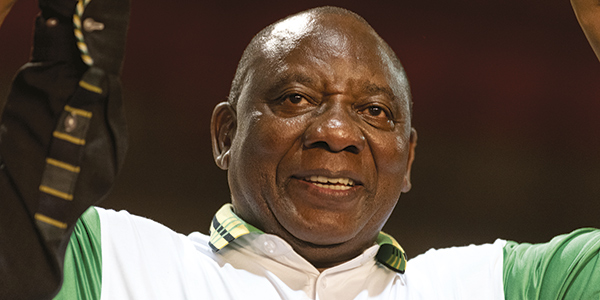Welcome for Ramaphosa
South Africa’s bishops “heartily” welcomed the State of the Nation Address delivered by the country’s new president, Cyril Ramaphosa last week.
Former President Jacob Zuma, 75, resigned from office on 14 February, saying in a televised address that he disagreed with the way the ruling African National Congress (ANC) had pushed him towards an early exit but would accept its orders. Ramaphosa, previously Zuma’s deputy, was sworn in as president on 15 February until the 2019 elections.
“The emphasis on the reduction of corruption in all its forms can only be welcomed,” the bishops said in a 17 February statement, immediately following Ramaphosa’s first major speech as President in which he hailed a “new dawn” in South Africa and promised to “turn the tide of corruption”. His proclamation that he would streamline government services, put state-owned enterprises into safe hands and appoint new leaders to the country’s National Prosecuting Authorities “will allow for a more efficient government,” said the statement, signed by William Slattery, Archbishop of Pretoria. “We now all look to implementation.”
The former prefect of the Congregation for the Doctrine of the Faith, Cardinal Gerhard Müller, has sharply criticised the possibility of blessing same-sex couples, according to reports in the German Tagespost and the Slovakian broadcaster Radio Lumen. “If a priest blesses a homosexual couple, that is an atrocity in a sacred place, as it sanctions something that God does not approve of,” he told journalists at question time after a conference in Bratislava. He was also “not happy” that bishops’ conferences were interpreting the Pope’s post-synodal exhortation Amoris Laetitia differently. “There can be no plurality on dogmatic questions,” he emphasised. He told the conference, on Pope John Paul II’s encyclical Veritatis Splendor, that “the servile conversion of the Church into an NGO [only to improve conditions in this world]”, was a “suicidal modernisation”.
The Catholic Bishop of Dresden has urged a “sincere commemoration” of the Allied “firestorm” bombing of his city, which left 25,000 civilians dead in February 1945. Bishop Heinrich Timmerevers, 65, was preaching at a Mass in Dresden’s Catholic Holy Trinity Cathedral to commemorate victims of the joint British and US air raids, before joining 11,000 people in a human chain around the city centre.
He said that the first phase of bombing, on Ash Wednesday 1945, had marked “the darkest moment in its history”.
Press campaign criticised
Archbishop Anthony Fisher of Sydney and Bishop Vincent Long Van Nguyen of Parramatta have both criticised a campaign by Fairfax, the publisher of The Sydney Morning Herald and The Age, against the Church over its purported wealth.
On 12 February, the newspapers said figures on the “actual value” of Church assets raised serious questions regarding its compensation payments to abuse survivors. Archbishop Fisher, in an article in The Sydney Morning Herald, wrote that given its many works, it was inevitable that the Church would have lots of “assets”, but its works were those of a non-profit organisation. “To accuse us of lying to the royal commission, hiding our assets from abuse victims, and failing in our obligations to rectify wrongs done is unjust and untrue,” Fisher said. “Any suggestion that we would not honour financial commitments to a survivor of abuse to ‘protect’ our financial assets is wrong and misleading,” said Bishop Long.
Baltimore Archbishop William Lori issued a Pastoral Letter on Ash Wednesday, “The Enduring Power of Dr Martin Luther King Jr’s Principles of Nonviolence,” recalling the teaching power of the Baptist minister as the United States prepares to mark the fiftieth anniversary of his assassination. In the letter, Lori recalled regrettable instances of racism in the city, and the continuing challenges of urban life that can lead to violence: “lack of education, unemployment, a proliferation of illegal weapons; drug abuse and gangs; the disintegration of the family; homelessness; and so much more”. Counselling against despair, Lori outlined six principles of nonviolence, such as, “Nonviolence holds that suffering can educate and transform,” and, “Nonviolence believes that justice will eventually triumph.”
Cardinal Daniel DiNardo, president of the United States Conference of Catholic Bishops, lamented the loss of life in the most recent mass killing, after 17 people were killed in a Florida high school. “We are deeply saddened by the shootings in Broward County, and by the needless and tragic loss of life,” DiNardo stated. “May the mercy of God comfort the grieving families and sustain the wounded in their healing … I pray also for unity in seeking to build towards a society with fewer tragedies caused by senseless gun violence.”
The head of Hungary’s Catholic Church has said Christianity as a “national ideology” is the best antidote to the “moral relativism” that he says is undermining democracy in the West. Hungary’s right-wing government, headed by Viktor Orban, a Calvinist, with a Catholic wife, Aniko Levari, (pictured above) has been widely criticised for publicly espousing Christian values while restricting the inflow of refugees and asylum-seekers. Cardinal Peter Erdo of Esztergom, Hungary’s Primate, speaking in Vienna, said that after the collapse of a system that sought to replace religion and morality with a Marxist-Leninist ideology, there was a cultural and ethical vacuum that threatened the functioning of the state and law. “So it’s understandable that political leaders see relativist ideologies as less attractive, and seek to rebuild society’s cultural and religious foundations,” he said.
Kenya’s Catholic bishops have warned that the country is “on a cliff edge”, as political disputes around last year’s presidential elections enter a sixth month. Refusing to accept Uhuru Kenyatta’s reappointment as President, the opposition leader, Raila Odinga, swore himself in as “the people’s president”. “The nation is bleeding, and we should work hard to bring it back to shape during Lent,” Archbishop Zacchaeus Okoth of Kisumu told Catholics at the launch of a Lent campaign on the theme of reconciliation.



 Loading ...
Loading ...